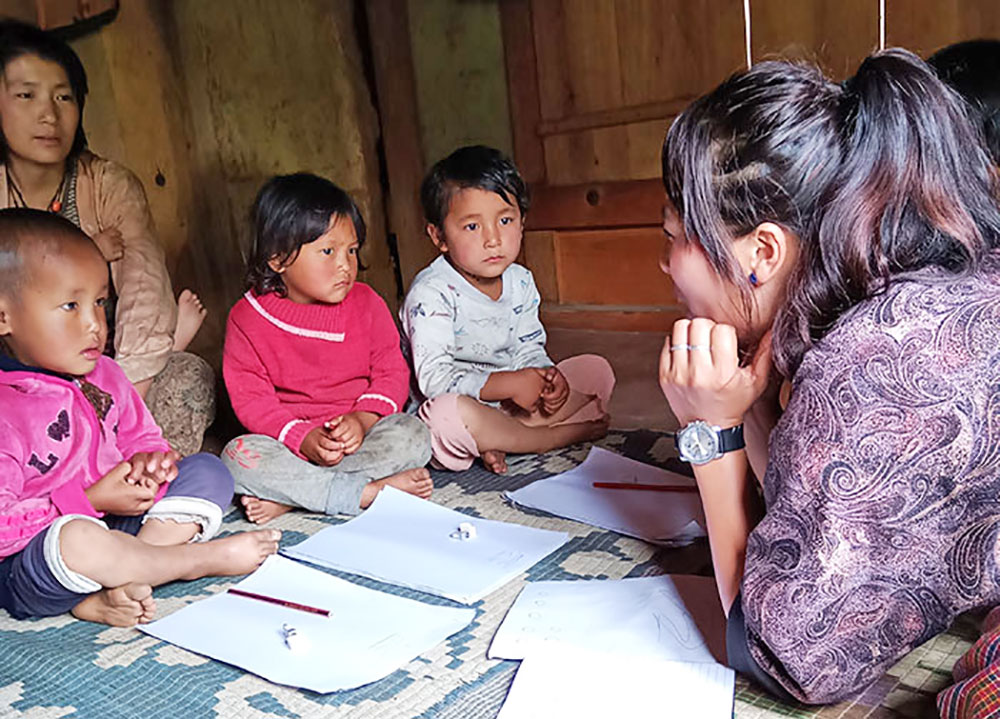Goal seen as ambitious without understanding ground realities
Yangchen C Rinzin
The government’s target is to increase the Early Childhood Care and Development (ECCD) enrolment rate to 50 percent by 2024 and 100 percent by 2030.
But the ground realities could present a stumbling block to the plan.
Lack of facilitators, the bureaucratic procedures in recruiting facilitators, lack of funds to establish ECCD centres, and professional development of ECCD facilitators are major challenges in the education ministry’s plan to achieve the target.
Centres are being established, but many without facilitators. For instance, four months after the inauguration of the Tshalumaphey ECCD Centre in Thimphu, the it is yet to open. There are no facilitators. The ECCD centre at Guma in Punakha has remained closed because the only facilitator is on maternity leave. Many centres flopped after grand openings because of a lack of manpower to run them.
An official from the ECCD and SEN division of the education ministry said that the 50 percent target is ambitious considering that the ministry has achieved only about 24 percent as of now.
‘There is no investment,” he said. “If there are adequate resources, we can still achieve the target.”
The official said that the ministry tries to address the professional development of ECCD facilitators through a two-week basic training and diploma programme for fewer facilitators. ECCD facilitators, otherwise, should be qualified with at least a university degree level of education and training, given the professional demand for quality facilitators.
There are 495 ECCD centres across the country including community centres, private and operated by non-government organisations with 8,026 students. About 947 facilitators manage them.
Despite the previous government’s target to establish centres in every chiwog, there are only 453 ECCD centres with 7,072 students and 729 facilitators.
The official said that the ECCD is important because according to neuroscience research, the time from birth until a child is five years old is the most critical and sensitive period given that 85 percent to 95 percent of human development takes place at this age.
“The foundation of whatever an individual can possibly become in life in terms of health, behaviours, attitude, learning, emotional strength, social competencies and intelligence are formed between birth and five years,” he added.
Many private ECCD operators in Thimphu agree that ECCD is the most important part of a child’s life to prepare them for school and that it was time public ECCDs were taken seriously.
A private ECCD operator said that ECCD would help children gain confidence and learn by focusing on domains of early childhood like cultural, social, emotional, cognitive, and general knowledge.
“From my experience, I find that most parents want the best for their children. Through play, children are exposed to concepts, ideas, emergent literacy including how to communicate and behave to make friends,” she said.
According to a UNICEF report on the evaluation of the ECCD programme in Bhutan, enrolment in ECCD is lowest in the nomadic and remote community. It also states that rural and growing numbers of poor children in urban areas cannot afford ECCDs, which are being privatised.
The education officials said that establishing ECCDS is difficult because settlements are scattered and there are not many children.
However, to address such challenges, the ministry is exploring alternatives such as mobile ECCD centres and home-based ECCD interventions.
The midterm review of the education ministry’s 12th Plan also showed that the ministry has revised the budget for the ECCD programme to Nu 177.58 million (M). The financial expenditure for ECCD as of December 2020 was Nu 109.43M.
Way forward
The ministry has also secured a budget of Nu 116.2M through GPE funding to establish 216 ECCD centres, and diplomas in ECCD for 150 facilitators.
The budget for the fiscal year 2021-2021, which was endorsed recently in the Parliament, the ministry was advised to assess the need for ECCD and review the continuation of non-formal education in consultation with the Royal Civil Service Commission.
Based on the outcome of the assessment, the budget for ECCD recruitment will be adjusted accordingly as per the fiscal budget.
The 21st century Economic Roadmap has also recommended investing smartly in early childhood after recognising that the first six years of childhood are critical.
The roadmap has advised exploring the possibility of outsourcing the operation of ECCDs to the private sector with financial support from the government.


